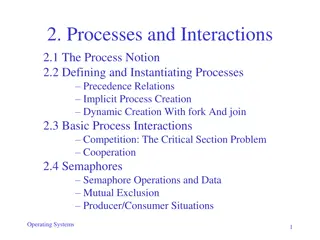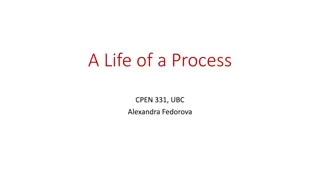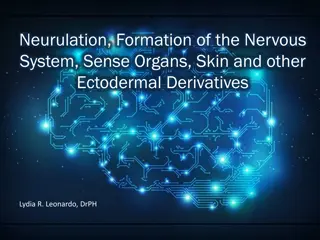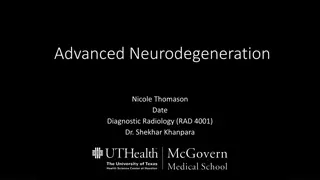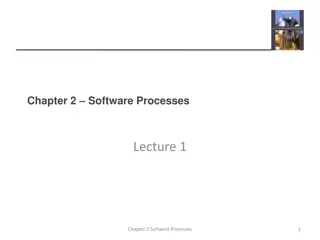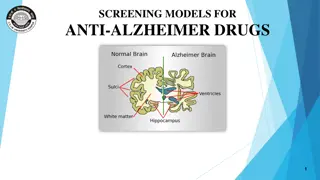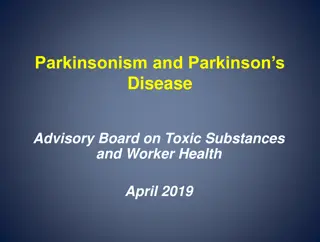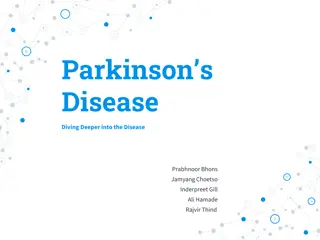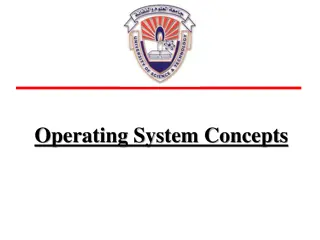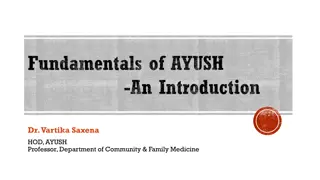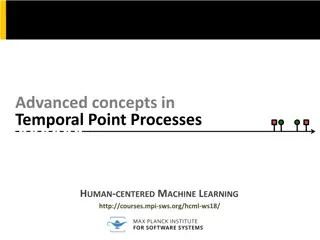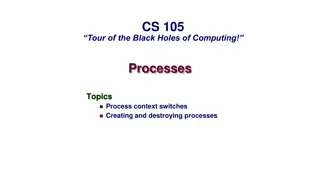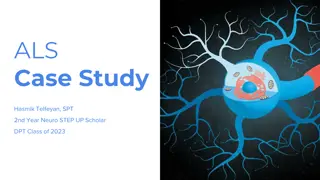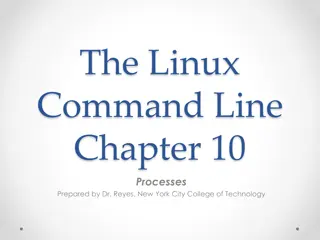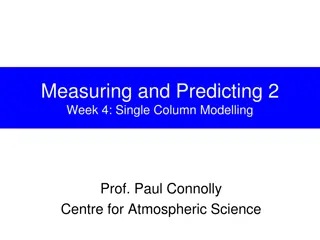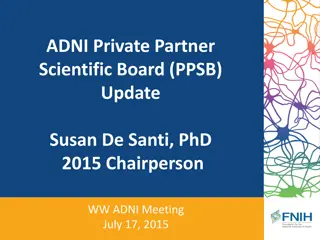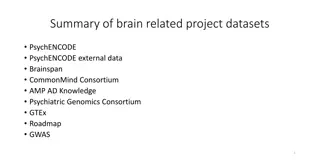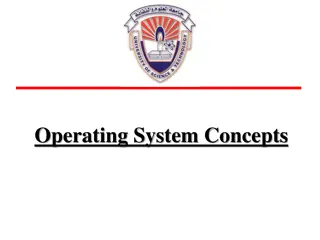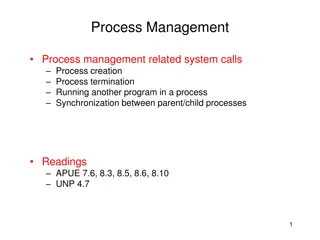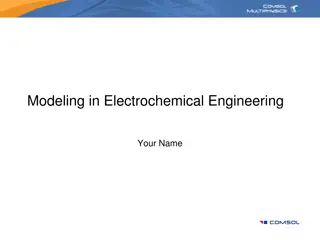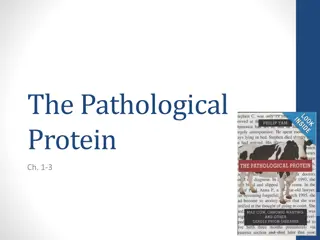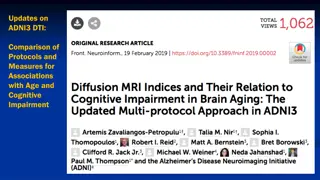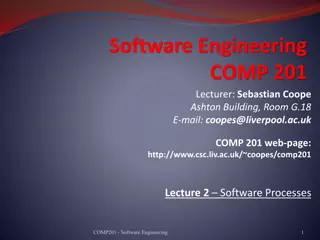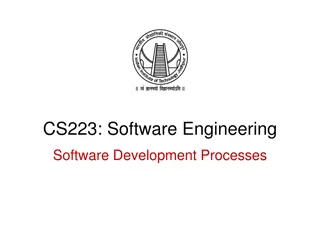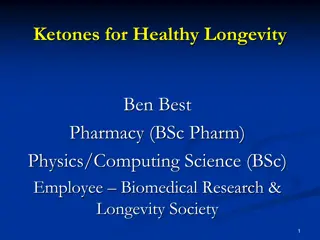Processes and Interactions
Processes in operating systems involve executing programs on CPUs, with each process having its own CPU. Processes run concurrently and can cooperate or compete for resources. Defining, creating, and managing processes is crucial for system efficiency and performance. Precedence relations, semaphore
1 views • 38 slides
A Life of a Process
This content delves into the creation and management of processes in operating systems, covering concepts such as forking processes, process states, address space management, copying processes, and key functions involved in process handling. It provides insights on constructing processes from scratc
0 views • 35 slides
Embryonic Development: Key Processes and Organization
Embryonic development involves neurulation, organogenesis, and morphogenetic processes that shape the nervous system, sense organs, skin, and other ectodermal derivatives. The embryo undergoes allocation and differentiation processes, influenced by epigenetic events and the action of organizers. Emb
2 views • 25 slides
Advanced Neurodegeneration in a 50-Year-Old Female: A Diagnostic Radiology Case Study
Patient Nicole Thomason, a 50-year-old female, presented with memory concerns and progressive cognitive decline. Initial imaging showed subtle changes, while recent PET CT revealed marked hypometabolism in specific brain regions indicative of advanced neurodegenerative disorder, potentially Alzheime
0 views • 19 slides
Understanding Coastal Processes and Erosion
Coasts are dynamic environments shaped by a variety of processes such as erosion and transportation. Waves influence the size and energy of waves, while erosion is caused by processes like corrasion and solution. Coastal transportation involves suspension, solution, and saltation. The impact of mari
6 views • 18 slides
Understanding Software Processes and Models
Software processes are structured activities essential for software system development, involving specification, design, validation, and evolution. Various process models and approaches like the Rational Unified Process and agile methods are discussed, highlighting the importance of adaptability in
2 views • 105 slides
Understanding Screening Models for Anti-Alzheimer Drugs
Alzheimer's disease is a prevalent neurodegenerative brain disorder characterized by memory loss and other cognitive impairments. This article discusses the etiology, risk factors, and pathophysiology of Alzheimer's disease, along with in-vitro screening models used to test potential drugs, focusing
0 views • 24 slides
Understanding Parkinsonism: Symptoms, Classification, and Pathology
Parkinsonism encompasses a group of progressive syndromes with symptoms such as bradykinesia, tremors, and rigidity. Parkinson's Disease is the most common form, but there are various classifications including primary and secondary causes. Pathologically, it involves the loss of dopaminergic neurons
0 views • 20 slides
Understanding Phonological Processes in English Language
Phonological processes involve changes in linguistic sounds over time, impacting language fluency and oral production significantly. EFL students can benefit from knowledge of these processes, like linking, gemination, elision, metathesis, assimilation, haplology, and coalescence, to enhance their l
0 views • 17 slides
Advanced Treatment Processes for Faecal Sludge Management
Treatment processes for faecal sludge management involve various stages including preliminary treatment, primary treatment, secondary treatment, and tertiary treatment. Each stage employs mechanical, biological, and chemical processes to separate, decompose, and remove contaminants from the sludge,
0 views • 7 slides
Understanding Parkinson's Disease: Diving Deeper into the Neurodegenerative Disorder
Parkinson's disease is a neurodegenerative disorder that impacts dopamine levels in the brain. The history, epidemiology, causes, and pathophysiology of the disease are explored, shedding light on its significant impact on the nervous system. Genetic and environmental factors play a role in the deve
0 views • 25 slides
Understanding CPU Scheduling in Operating Systems
In a single-processor system, processes take turns running on the CPU. The goal of multiprogramming is to keep the CPU busy at all times. CPU scheduling relies on the alternating CPU and I/O burst cycles of processes. The CPU scheduler selects processes from the ready queue to execute when the CPU i
1 views • 26 slides
Understanding Renewal Processes in Continuous Time
Renewal theory is a branch of probability theory that extends Poisson processes for various inter-arrival times. A renewal process models randomly occurring events over time, such as customer arrivals at a service station or natural phenomena like earthquakes. This article delves into the concept of
0 views • 20 slides
Machineries and Tools for Dry Wash Processes in Garment Industry
Garment washing plays a vital role in enhancing the appearance and quality of textiles. This presentation by Md. Hojayfa delves into the machineries and tools utilized in the dry wash processes of the garment industry. It covers the machines used in washing plants, the objectives of washing, dry pro
1 views • 7 slides
Generic Personal Health Budget (PHB) Processes Overview
This slide deck provides a guide on how to set up, manage, and monitor Personal Health Budgets (PHBs) in various service areas. It covers processes for setting up PHBs, commissioning external care, changing delivery methods, and monitoring money management. The focus is on mental health, learning di
0 views • 17 slides
Holistic Approach to Health and Healing: Exploring AYUSH Fundamentals
Explore the fundamentals of AYUSH (Ayurveda, Yoga, Unani, Siddha, and Homeopathy) through a comprehensive introduction by Dr. Vartika Saxena. Delve into topics ranging from allergic diseases, neurodegenerative conditions, and cancers to psychological and psychiatric issues. Discover the importance o
0 views • 42 slides
Understanding Advanced Concepts in Temporal Point Processes for Human-Centered Machine Learning
Explore advanced concepts in temporal point processes through the lens of human-centered machine learning. Topics include marked temporal point processes, independent identically distributed marks, dependent marks, and mutually exciting marks. Learn about stochastic dynamical systems such as the Sus
0 views • 8 slides
Understanding Nuclear Decays and Reactions in Stellar Astrophysics
Nuclear decays and reactions, driven by weak interactions, are vital in stellar astrophysics. Various processes like bound-state beta-decay impact nucleosynthesis and cosmochronology. Specific processes in stars involve capture reactions, electron capture, and neutrino-nucleus interactions. Stellar
0 views • 22 slides
Understanding Processes and Multiprocessing in Computing
Processes in computing provide the illusion of exclusive CPU and memory use for each program through logical control flow and address space management. Multiprocessing allows a computer to run multiple processes simultaneously, catering to various user applications. This concept challenges the tradi
0 views • 39 slides
Daily Batch Process for Demand Forecasting - Roadmap and Import Actions
In this data workflow, a roadmap is prepared for batch processes related to demand forecasting. It includes steps for uploading and importing data into Anaplan, SQL sources, EBS processes, and various file imports. The script names and processes are outlined with caution against renaming data hub pr
0 views • 14 slides
Understanding Programs and Processes in Operating Systems
Exploring the fundamental concepts of programs and processes in operating systems, this content delves into the definitions of programs and processes, the relationship between them, the components of a program, what is added by a process, and how processes are created. The role of DLLs, mapped files
0 views • 22 slides
Understanding Amyotrophic Lateral Sclerosis (ALS) and Case Study Analysis
Amyotrophic Lateral Sclerosis (ALS) is a progressive neurodegenerative disease affecting motor neurons, leading to muscle weakness and various symptoms. This case study focuses on Judy, a 52-year-old woman diagnosed with ALS, detailing her symptoms, progression, exercise routine, assistive device us
0 views • 16 slides
Understanding Linux Processes and Controlling Them
This content provides insights into Linux processes, including parent-child relationships, process management commands like ps and top, background jobs, bringing processes to the foreground, and terminating processes. It also covers killing processes using kill and killall commands.
0 views • 7 slides
Understanding Cloud and Precipitation Processes in Atmospheric Science
This week's module focuses on measuring, predicting, and modeling single-column processes related to clouds and precipitation. Topics covered include ODE and PDE models, advection equations, orographic clouds, warm and cold cloud processes, condensation, warm-rain processes, and more. The importance
0 views • 17 slides
ADNI Private Partner Scientific Board (PPSB) Update 2015
The ADNI Private Partner Scientific Board (PPSB) Update for 2015 highlights key leadership, partner organizations, deliverables, and accomplishments in advancing drug development. Susan De Santi as Chairperson, along with industry leaders, plays a crucial role in advising and collaborating with ADNI
0 views • 23 slides
Phonetic Processes Exercises for Linguistics Students
Practice identifying phonetic processes such as stridency deletion, stopping, fronting, and more with exercises involving target words. Determine which processes apply to various words and mark the likely processes for specific targets. Enhance your understanding of substitution processes in linguis
0 views • 5 slides
Overview of Major Brain Research Datasets and Consortia
This detailed summary provides information on significant brain-related project datasets and consortia, including PsychENCODE, BrainSpan, CommonMind Consortium, AMP-AD Knowledge, and more. Each dataset or consortium focuses on specific areas such as genomics, neuropsychiatric diseases, neurodegenera
0 views • 18 slides
Pure Birth Processes in Industrial Engineering
Birth-death processes, Yule-Furry models, and pure birth processes are discussed in the context of industrial engineering. The study of evolutionary processes, population dynamics, and radioactive transmutations are explored through mathematical models and examples. The concept of state transitions
0 views • 19 slides
Understanding Bovine Spongiform Encephalopathy (BSE) - The Mad Cow Disease
Subacute or chronic fatal neurodegenerative disease in adult cattle, Bovine Spongiform Encephalopathy (BSE) is a transmissible spongiform encephalopathy with spongy degeneration in the CNS. It is caused by an infectious protein called prion and is mostly found in Europe, with potential zoonotic impa
0 views • 22 slides
Interprocess Communication in Operating Systems
In operating systems, processes may execute independently or cooperatively, affecting or being affected by other processes. Interprocess communication allows processes to share data and information for reasons like information sharing, computation speedup, modularity, and convenience. There are two
0 views • 22 slides
Impact of Raft Association of NF155 on Microglial Cells' Inflammatory Response
Multiple sclerosis (MS) is a neurodegenerative disease affecting millions globally by causing myelin loss in the CNS axons. This study investigates the role of NF155 raft association in the inflammatory response of microglial cells, shedding light on potential treatment strategies for MS. Liposome t
0 views • 9 slides
Importance of a BDC Binder in Documenting Processes
Documenting processes in your BDC using a BDC Binder is crucial to ensure knowledge transfer, especially during turnover. A BDC Binder can be a physical or digital folder used for training and daily operations, containing information like tool logins, call scripts, appointment processes, and dealers
0 views • 8 slides
Understanding Process Management in Computer Systems
Exploring the concepts of process management in computer systems, including process creation, termination, running programs, synchronization between processes, and the components involved in managing processes such as memory, CPU, files, and devices. The importance of processes in sharing system res
0 views • 22 slides
Understanding Electrochemical Systems and Processes
Electrochemical engineering involves the study of devices and processes that convert chemical energy to electrical energy through ionic conductors. This field explores redox reactions, energy-producing processes, electrocatalysis, anodic and cathodic reactions, and the interplay between thermochemic
0 views • 25 slides
Unveiling the Mysteries of Pathological Proteins
The Pathological Protein delves into the intriguing case of Stephen Churchill, a young man whose sudden decline and tragic death spark questions about his mysterious neurological condition. As the investigation unfolds, more puzzling cases emerge, shedding light on the enigmatic world of neurodegene
0 views • 21 slides
Dermatology Clinical Research in Scotland: Challenges and Opportunities
Clinical research in dermatology in Scotland faces challenges and opportunities, led by experts like Dr. Richard Weller and Prof. David Crossman. The Chief Scientists Office (CSO) plays a key role in supporting high-quality health research in Scotland, fostering partnerships with NHS Research Scotla
0 views • 21 slides
Insights into DTI and Advanced MRI Measures for Cognitive Impairment
Comparison of DTI protocols and measures in 317 participants revealed strong associations with age and cognitive impairment. MD and TDF-FA emerged as best measures, with robust connections to age. NODDI in advanced MRI allows for differentiation of A-beta positive and negative groups, offering great
0 views • 6 slides
Understanding Software Engineering Processes
Dive into the world of software engineering processes through a comprehensive exploration of building development processes, tasks involved, and the characteristics of a process. Discover how these processes ensure systematic software development and the key steps required for successful project com
0 views • 33 slides
Understanding Software Engineering and Development Processes
Explore the key concepts of software engineering, including misconceptions, legacy software, and development phases. Learn about professional responsibilities, the need for software processes, the ETVX model, and different properties of software processes. Discover the components of software process
0 views • 57 slides
Benefits of Ketones in Promoting Longevity and Health
Explore the benefits of ketones in promoting healthy longevity, including the chemistry, biochemistry, and physiology behind ketones, ketogenic diet benefits, and their role in managing diseases like epilepsy, cancer, and neurodegenerative conditions. Learn how a low-carbohydrate ketogenic diet can
0 views • 40 slides
